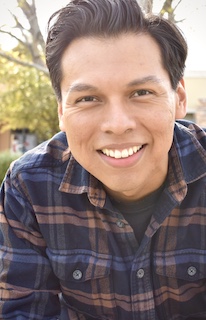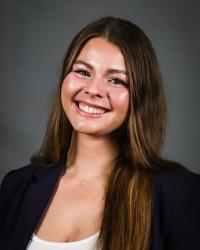From Flagstaff to France, students take ASU language project to the community

Chris Hoshnic was having dinner with a few friends in February when he told them about an event he was working on.
Hoshnic, an intern in Arizona State University’s Thousand Languages Project, was creating a community poem titled "The Landscapes of Language." The poem would be composed of words or phrases people submit showing their appreciation for Indigenous lands and read at the Northern Arizona Book Festival on April 1 in Flagstaff.
Hoshnic had his friends engage in the exercise, and later that night they texted or emailed to him to say they were surprised at the results.
“They said it was really difficult but pretty rewarding, too,” said Hoshnic, a junior who is pursuing a Bachelor of Arts degree in English through ASU Online. “One my friends said they went down a rabbit hole of what actual native land they were on. It was kind of cool. It just sparked curiosity, seeing what’s around them and outside of themselves.
“I think that’s really what is important to me. A lot of people don’t realize a big part of Phoenix is built on Native American lands. One of my good friends lives close to the reservation in Scottsdale, and she was just surprised native land was so close to her.”
Chris Hoshnic
Hoshnic is one of two ASU students doing community outreach activities this April for the Thousand Languages Project.
Acacia Wastchak, a junior who is pursuing a Bachelor of Science in international trade at the Thunderbird School of Global Management, is putting on an Earth Day Community Translation Challenge in France.
Flagstaff and France. Proving once again that ASU has no borders.
“I think it speaks to the fact that ASU is very international,” Wastchak said.
The Thousand Languages Project was created to translate works from Hayden’s Ferry Review, a semi-annual international literary journal edited by Master of Fine Arts students at ASU.
“It’s a project that I think is all about inclusion,” said Jacqueline Balderrama, a Mexican-American poet who is leading the Thousand Languages Project as the Virginia G. Piper fellow-in-residence. “Inclusion in the way where language can bring us together.”
Balderrama said outreach events such as the Northern Arizona Book Festival and Earth Day Community Translation Challenge are ways to draw people to the Thousand Languages website and “demonstrate how translation can build community and connect people.”
Those relationships aren’t just person to person. Hoshnic, who grew up on the Navajo Nation, said the multilingual community poem he and Balderrama edited and arranged — which is on the Thousand Languages website — will help people appreciate their relationship with the land they live on.
“I understand that the Thousand Languages Project is largely about translation, and I think the recognition of land is really the root of it for me,” Hoshnic said. “I think that’s really, really important. I think recognizing land and language are one in the same.”
Acacia Wastchak
Meanwhile, nearly 6,000 miles away in Marseille, France, Wastchak took on the task of running the Earth Day Community Translation Challenge. Wastchak, who needed an internship to complete her degree, was already translating works for the Thousand Languages Project and studying abroad.
Marry the best of three worlds, and the idea was born for the translation challenge.
“Since I was studying abroad, Thunderbird was like, ‘OK, if you do it while you’re studying abroad, in your community there, that brings in the international aspect,’” Wastchak said. “Then, of course, using marketing skills, cross-cultural communication and things like that.”
The translation challenge is for Jason Labbe’s poem “Blue in Green.” The poem:
If there are trees
Wherever you live now,
Look up. See sky,
Like chips of smooth seaglass,
Between the stripped limbs.
If there is water,
Look down
At the blizzard of minnows
In the weeds. Remember:
Space between bodies
Is necessary. Find me
If you have forgotten.
There are few places on earth more suited for the translation challenge than Marseille, where Wastchak is living. The city is the home of Aix-Marseille University, which has more than 80,000 students on five campuses and boasts a multilingual student body.
“It’s not just European students,” Wastchak said. “There are students here from the Middle East, Africa, Australia, South America. So, I’m trying to get as many languages as possible for the translations.”
One of the first translations Wastchak received was in Bengali – the official national language of Bangladesh – and she also got a translation in Sard, a romance language spoken on the Western Mediterranean island of Sardinia.
She made an e-magazine and printable zine of the translations, which will be available soon on the Thousand Languages website.
“It’s just a really cool thing to do,” Wastchak said.
And a way, along with Hoshnic’s poem, to bring the Thousand Languages Project to a larger audience.
Top photo by Suzy Hazelwood via Pexels.
More Arts, humanities and education

ASU graduate education programs are again ranked among best
Arizona State University’s Mary Lou Fulton College for Teaching and Learning Innovation continues to be one of the best graduate colleges of education in the United States, according to the…
ASU FIDM students to see their designs on the runway at Uncertainty Fashion Showcase
Nola Hill is perfecting every stitch of her fashion design collection, which she started conceptualizing last summer.She is among 30 ASU FIDM fashion design students who have been working late into…

ASU+GSV Summit brings experts together to discuss innovation in education
This week, Arizona State University President Michael Crow and other university leadership joined education and learning experts from around the globe at the ASU+GSV education technology summit in…



